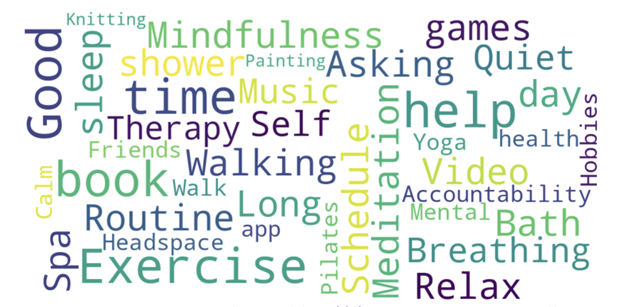Self-care is an integral part of reducing stress, improving well-being, and facilitating better mental and physical health. No one can be “all work” 100% of the time without burning out, but sometimes it can be challenging to find time to prioritize self-care in a busy schedule— especially if we don’t know exactly what it means to us.
In honor of May being Mental Health Awareness Month, we surveyed our team members to find out how they practice self-care. We asked five quick questions, and the answers made it clear that while everyone is different— and thus will have their own favorite ways to relax or blow off some steam— there are a few common trends that anyone can use to find what helps them find joy and peace day-to-day.
Here’s what we asked:
- What is your go-to self-care activity?
- How do you incorporate self-care into your daily routine?
- What resources do you find helpful for managing stress and maintaining health?
- Can you share a personal tip or trick that helped you improve your mental health?
- What challenges do you face when trying to prioritize self-care, and how do you overcome them?
Based on the answers, we derived these five essential tips that can help you get started on your self-care journey.
1. You can choose a self-care activity that enriches you
Self-care is not about productivity, but you can choose an activity that still provides enrichment and potentially even health benefits.
Many of our team members said that exercise was a critical self-care component, and that they prioritized activities like walking their dog, taking a yoga or pilates class, or taking an exercise class. Several stressed that “getting out and touching grass” was so important, especially when working at a desk all day.
Other team members noted that their favorite self-care activity was mindful, with hobbies like knitting, painting, baking, cross-stitching, and meditation being mentioned. Mindfulness is tied to overall improved well-being and can be deeply enriching.
Some also preferred to read a few chapters of a good book, or spend some time playing a video game, both of which have been scientifically linked to reduced stress and better cognition.
All this said, self-care doesn’t have to be an activity that feels productive in some way; you can go soak in a hot bath or relax in a hammock with a great drink. As long as it works for you, you’re on the right track.
2. Daily, routine self-care can ensure it’s a priority
Life gets busy, and sometimes trying to find time for ourselves can feel overwhelming. Trying to squeeze in an extra gym session or a few chapters of a good book just doesn’t feel as critical as helping kids get their homework done or getting the house ready for guests.
Because of this, it’s imperative to make small acts of self-care part of your daily routine.
Multiple team members said that taking time for a quiet cup of coffee every morning was essential to starting their days well, for example. Others said that a daily walk was built into their routine, and sometimes even part of their formal to-do list.
Sometimes, this means considering how self-care fits into your schedule. One mentioned that the time before their kids wake up or after they go to bed is an ideal time for self-care. Another mentioned prioritizing shutting down from work at a specific time so they’d have time for relaxation before bed.
Regardless of how you go about it, one thing is clear: Small, daily routines can be easier to implement and can help you be more consistent.
3. Leverage resources available to you
If you aren’t entirely sure where to start with self-care or mental health improvement— or if you want to find ways to increase self-care in your life— you can take advantage of resources available to you.
Some of our team members said that therapy was an essential resource, as therapists can provide helpful stress management techniques.
Others use apps like Calm and Headspace, both of which can promote relaxation through mindfulness and meditation. A few team members mentioned Finch, which can help you set and track self-care goals.
If apps aren’t really your thing, that’s okay; team members mentioned other options, including:
- Journaling both with and without prompts.
- Following social media accounts focused on mental health or self-care.
- Books like “The Let Them Theory” and “Why Zebras Don’t Get Ulcers.”
4. Prioritize caring for your mental health
When your mental health is in good standing, it can directly impact your overall well-being and your physical health.
Our team members had a variety of suggestions for how to strengthen their mental health, including:
- Talking to a therapist.
- Not overcommitting and saying no when you need to.
- Stepping away from stressors to clear your head, whether it’s taking a walk during your lunch break or knowing you can tackle a problem tomorrow if you’re overwhelmed now.
- Asking for help if you need it.
- Being mindful of vices and cutting back when possible.
- Prioritizing health-focused habits like getting good sleep and exercise.
5. Create plans to overcome obstacles to self-care
Have you ever been looking forward to something at the end of a long day— whether it was going for a run, binge watching your favorite show, or taking a long bath— only to have something urgent come up? There’s an emergency at work, kids have a last-minute project, or a pet needs to be rushed to the vet after getting into something they shouldn’t have?
We all have obstacles that can interfere with our self-care plans, and thus our mental health.
Creating a routine can help, but it’s important to create routines that account for these obstacles.
One team member, for example, shared that they struggled to actually remember to take a break. They’ve started setting alarms to ensure that they do.
Some people need external support, with one person saying that they struggled to carve out the time, but that their friends helped hold them accountable. Another said that they schedule walks with a neighbor to ensure they go, because someone is waiting for them.
If you keep running into the same challenges (even if it’s just “I’m too tired by the end of the day”), that’s okay! Create a plan to work around it.
Prioritizing self-care, mental health, and well-being
A mindful approach to self-care isn't just a luxury—it's a necessity for maintaining balance in our busy lives.
The five tips shared by our team members highlight that self-care looks different for everyone, but the fundamental principles remain consistent: choose activities that bring you joy, incorporate small moments of self-care into your daily routine, utilize available resources, prioritize your mental health, and plan around obstacles.
Remember that self-care is not selfish—it's essential. By taking time to nurture yourself, you'll be better equipped to handle life's challenges and show up as your best self for those around you.
This Mental Health Awareness Month, we encourage you to reflect on your own self-care practices and consider how you might incorporate some of these suggestions into your routine. Your future self will thank you.
Want to learn more about finding a good work-life balance while still excelling with all of your professional goals? Check out our blog for more tips!





.ashx?as=1)